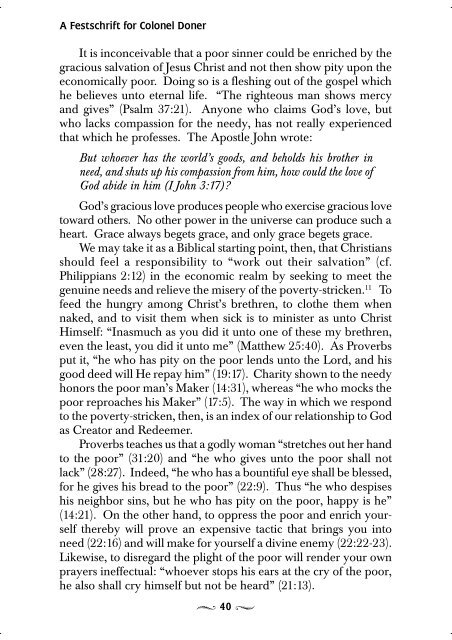A Life of Transformation - World Evangelical Alliance
A Life of Transformation - World Evangelical Alliance
A Life of Transformation - World Evangelical Alliance
You also want an ePaper? Increase the reach of your titles
YUMPU automatically turns print PDFs into web optimized ePapers that Google loves.
A Festschrift for Colonel Doner<br />
It is inconceivable that a poor sinner could be enriched by the<br />
gracious salvation <strong>of</strong> Jesus Christ and not then show pity upon the<br />
economically poor. Doing so is a fleshing out <strong>of</strong> the gospel which<br />
he believes unto eternal life. “The righteous man shows mercy<br />
and gives” (Psalm 37:21). Anyone who claims God’s love, but<br />
who lacks compassion for the needy, has not really experienced<br />
that which he pr<strong>of</strong>esses. The Apostle John wrote:<br />
But whoever has the world’s goods, and beholds his brother in<br />
need, and shuts up his compassion from him, how could the love <strong>of</strong><br />
God abide in him (I John 3:17)?<br />
God’s gracious love produces people who exercise gracious love<br />
toward others. No other power in the universe can produce such a<br />
heart. Grace always begets grace, and only grace begets grace.<br />
We may take it as a Biblical starting point, then, that Christians<br />
should feel a responsibility to “work out their salvation” (cf.<br />
Philippians 2:12) in the economic realm by seeking to meet the<br />
genuine needs and relieve the misery <strong>of</strong> the poverty-stricken. 11 To<br />
feed the hungry among Christ’s brethren, to clothe them when<br />
naked, and to visit them when sick is to minister as unto Christ<br />
Himself: “Inasmuch as you did it unto one <strong>of</strong> these my brethren,<br />
even the least, you did it unto me” (Matthew 25:40). As Proverbs<br />
put it, “he who has pity on the poor lends unto the Lord, and his<br />
good deed will He repay him” (19:17). Charity shown to the needy<br />
honors the poor man’s Maker (14:31), whereas “he who mocks the<br />
poor reproaches his Maker” (17:5). The way in which we respond<br />
to the poverty-stricken, then, is an index <strong>of</strong> our relationship to God<br />
as Creator and Redeemer.<br />
Proverbs teaches us that a godly woman “stretches out her hand<br />
to the poor” (31:20) and “he who gives unto the poor shall not<br />
lack” (28:27). Indeed, “he who has a bountiful eye shall be blessed,<br />
for he gives his bread to the poor” (22:9). Thus “he who despises<br />
his neighbor sins, but he who has pity on the poor, happy is he”<br />
(14:21). On the other hand, to oppress the poor and enrich yourself<br />
thereby will prove an expensive tactic that brings you into<br />
need (22:16) and will make for yourself a divine enemy (22:22-23).<br />
Likewise, to disregard the plight <strong>of</strong> the poor will render your own<br />
prayers ineffectual: “whoever stops his ears at the cry <strong>of</strong> the poor,<br />
he also shall cry himself but not be heard” (21:13).<br />
40
















